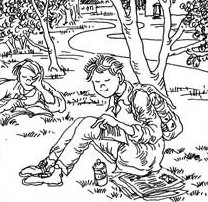Chinese youths who live, study and work in Western and other foreign countries surprised the world last month when they staged rallies to roar their anger at the Western media's biased reports about the situation in Tibet and the Beijing Olympic Games.
Their behavior also came as a surprise to domestic educators and media commentators, who said they had not expected the Chinese youths, both at home and overseas, to demonstrate so strong a love of the motherland.
In today's China, the young people in their twenties are called "balinghou," literally '80-after, or post-1980s. These '80-afters are generally thought to be selfish and indifferent to the fate of the country. Yet what they did during the past month was an eye-opener for their parents and grandparents. The elders went into ecstasies over the discovery of the patriotic responsibility in the '80-afters and applauded their moves to safeguard China's national dignity.
Meanwhile, there are appeals, from the elders, to the young people to keep their "cool" and "express their love of the country in a rational manner".
Such reactions, whether praises of the youths or appeals for their sanity, are definitely well-grounded. But we need to do more to understand the new generation at this time as we reflect on what we did not know about them. Especially, we need to review our educational culture.
In traditional Chinese educational culture, parents and teachers dictate what the children should learn. The youngsters are crammed with ideas, knowledge and mathematic puzzles-solving skills without being encouraged to think independently. The elders also try hard to keep the children in an aseptic ward walled by parental authority and ethical preachings against any evil influences. At the same time, they pamper the kids with all kinds of material comforts.
This kind of ethics education leads to two results. Those children who are obedient by nature may develop a sense of ethical purity but they may lack the ability to think independently. This inability could prevent them from building successful careers unless they learn to be creative later in their careers. Those children who are defiant will try every means to escape the ward, only to be influenced by various social evils which they may lack the immunity to resist.

In fact, the ethics ward is only a result of the teachers' and parents' wishful thinking. It never succeeded in protecting children from evil influences. The youngsters nowadays have all kinds of access to these influences, through Internet and the media, for instance. However, they get no timely advice from their parents and teachers as they gain the accesses secretly.
Youths are curious about anything new and have a strong interest in trying them. Adults should not try to forbid them contacting these things simply because they may involve danger, for bans can only incite a stronger interest and a desire for secret accesses. Instead, they should allow kids some exposure to the things and give them some advice at the same time. We should believe in young people's ability to draw lessons from reality.
The maturity demonstrated by the young overseas Chinese in their actions to protect the Olympic torch relay during the past month is a good example of their capacity for self-education.
They have lived in Western countries for a few years and saw with their own eyes the hypocritical face of Western democracy and the true nature of the "fair and impartial media". They have learned that the rise of China is not always a welcome thing for everybody in the process of globalization. They must have realized that the slogan of "one world" is but still "one dream" .
E-mail: liushinan@chinadaily.com.cn
(China Daily 05/07/2008 page8)